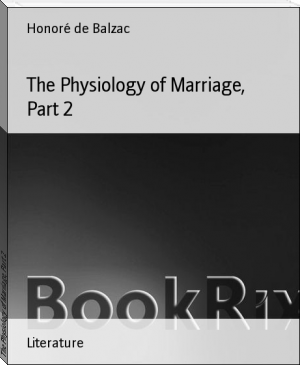The Physiology of Marriage, Part 1 - Honoré de Balzac (english novels to improve english .txt) 📗

- Author: Honoré de Balzac
Book online «The Physiology of Marriage, Part 1 - Honoré de Balzac (english novels to improve english .txt) 📗». Author Honoré de Balzac
The woman being shrewd, intelligent, sarcastic and having leisure to meditate over an ironical phrase, can easily turn you into ridicule during a momentary clash of opinions. The day on which she turns you into ridicule, sees the end of your happiness. Your power has expired. A woman who has laughed at her husband cannot henceforth love him. A man should be, to the woman who is in love with him, a being full of power, of greatness, and always imposing. A family cannot exist without despotism. Think of that, ye nations!
Now the difficult course which a man has to steer in presence of such serious incidents as these, is what we may call the _haute politique_ of marriage, and is the subject of the second and third parts of our book. That breviary of marital Machiavelism will teach you the manner in which you may grow to greatness within that frivolous mind, within that soul of lacework, to use Napoleon's phrase. You may learn how a man may exhibit a soul of steel, may enter upon this little domestic war without ever yielding the empire of his will, and may do so without compromising his happiness. For if you exhibit any tendency to abdication, your wife will despise you, for the sole reason that she has discovered you to be destitute of mental vigor; you are no longer a _man_ to her.
But we have not yet reached the point at which are to be developed those theories and principles, by means of which a man may unite elegance of manners with severity of measures; let it suffice us, for the moment, to point out the importance of impending events and let us pursue our theme.
At this fatal epoch, you will see that she is adroitly setting up a right to go out alone.
You were at one time her god, her idol. She has now reached that height of devotion at which it is permitted to see holes in the garments of the saints.
"Oh, mon Dieu! My dear," said Madame de la Valliere to her husband, "how badly you wear your sword! M. de Richelieu has a way of making it hang straight at his side, which you ought to try to imitate; it is in much better taste."
"My dear, you could not tell me in a more tactful manner that we have been married five months!" replied the Duke, whose repartee made his fortune in the reign of Louis XV.
She will study your character in order to find weapons against you. Such a study, which love would hold in horror, reveals itself in the thousand little traps which she lays purposely to make you scold her; when a woman has no excuse for minotaurizing her husband she sets to work to make one.
She will perhaps begin dinner without waiting for you.
If you drive through the middle of the town, she will point out certain objects which escaped your notice; she will sing before you without feeling afraid; she will interrupt you, sometimes vouchsafe no reply to you, and will prove to you, in a thousand different ways, that she is enjoying at your side the use of all her faculties and exercising her private judgment.
She will try to abolish entirely your influence in the management of the house and to become sole mistress of your fortune. At first this struggle will serve as a distraction for her soul, whether it be empty or in too violent commotion; next, she will find in your opposition a new motive for ridicule. Slang expressions will not fail her, and in France we are so quickly vanquished by the ironical smile of another!
At other times headaches and nervous attacks make their appearance; but these symptoms furnish matter for a whole future Meditation. In the world she will speak of you without blushing, and will gaze at you with assurance. She will begin to blame your least actions because they are at variance with her ideas, or her secret intentions. She will take no care of what pertains to you, she will not even know whether you have all you need. You are no longer her paragon.
In imitation of Louis XIV, who carried to his mistresses the bouquets of orange blossoms which the head gardener of Versailles put on his table every morning, M. de Vivonne used almost every day to give his wife choice flowers during the early period of his marriage. One morning he found the bouquet lying on the side table without having been placed, as usual, in a vase of water.
"Oh! Oh!" said he, "if I am not a cuckold, I shall very soon be one."
You go on a journey for eight days and you receive no letters, or you receive one, three pages of which are blank.--Symptom.
You come home mounted on a valuable horse which you like very much, and between her kisses your wife shows her uneasiness about the horse and his fodder.--Symptom.
To these features of the case, you will be able to add others. We shall endeavor in the present volume always to paint things in bold fresco style and leave the miniatures to you. According to the characters concerned, the indications which we are describing, veiled under the incidents of ordinary life, are of infinite variety. One man may discover a symptom in the way a shawl is put on, while another needs to receive a fillip to his intellect, in order to notice the indifference of his mate.
Some fine spring morning, the day after a ball, or the eve of a country party, this situation reaches its last phase; your wife is listless and the happiness within her reach has no more attractions for her. Her mind, her imagination, perhaps her natural caprices call for a lover. Nevertheless, she dare not yet embark upon an intrigue whose consequences and details fill her with dread. You are still there for some purpose or other; you are a weight in the balance, although a very light one. On the other hand, the lover presents himself arrayed in all the graces of novelty and all the charms of mystery. The conflict which has arisen in the heart of your wife becomes, in presence of the enemy, more real and more full of peril than before. Very soon the more dangers and risks there are to be run, the more she burns to plunge into that delicious gulf of fear, enjoyment, anguish and delight. Her imagination kindles and sparkles, her future life rises before her eyes, colored with romantic and mysterious hues. Her soul discovers that existence has already taken its tone from this struggle which to a woman has so much solemnity in it. All is agitation, all is fire, all is commotion within her. She lives with three times as much intensity as before, and judges the future by the present. The little pleasure which you have lavished upon her bears witness against you; for she is not excited as much by the pleasures which she has received, as by those which she is yet to enjoy; does not imagination show her that her happiness will be keener with this lover, whom the laws deny her, than with you? And then, she finds enjoyment even in her terror and terror in her enjoyment. Then she falls in love with this imminent danger, this sword of Damocles hung over her head by you yourself, thus preferring the delirious agonies of such a passion, to that conjugal inanity which is worse to her than death, to that indifference which is less a sentiment than the absence of all sentiment.
You, who must go to pay your respects to the Minister of Finance, to write memorandums at the bank, to make your reports at the Bourse, or to speak in the Chamber; you, young men, who have repeated with many others in our first Meditation the oath that you will defend your happiness in defending your wife, what can you oppose to these desires of hers which are so natural? For, with these creatures of fire, to live is to feel; the moment they cease to experience emotion they are dead. The law in virtue of which you take your position produces in her this involuntary act of minotaurism. "There is one sequel," said D'Alembert, "to the laws of movement." Well, then, where are your means of defence?-- Where, indeed?
Alas! if your wife has not yet kissed the apple of the Serpent, the Serpent stands before her; you sleep, we are awake, and our book begins.
Without inquiring how many husbands, among the five hundred thousand which this book concerns, will be left with the predestined; how many have contracted unfortunate marriages; how many have made a bad beginning with their wives; and without wishing to ask if there be many or few of this numerous band who can satisfy the conditions required for struggling against the danger which is impending, we intend to expound in the second and third part of this work the methods of fighting the Minotaur and keeping intact the virtue of wives. But if fate, the devil, the celibate, opportunity, desire your ruin, in recognizing the progress of all intrigues, in joining in the battles which are fought by every home, you will possibly be able to find some consolation. Many people have such a happy disposition, that on showing to them the condition of things and explaining to them the why and the wherefore, they scratch their foreheads, rub their hands, stamp on the ground, and are satisfied.
MEDITATION IX.
EPILOGUE.
Faithful to our promise, this first part has indicated the general causes which bring all marriages to the crises which we are about to describe; and, in tracing the steps of this conjugal preamble, we have also pointed out the way in which the catastrophe is to be avoided, for we have pointed out the errors by which it is brought about.
But these first considerations would be incomplete if, after endeavoring to throw some light upon the inconsistency of our ideas, of our manners and of our laws, with regard to a question which concerns the life of almost all living beings, we did not endeavor to make plain, in a short peroration, the political causes of the infirmity which pervades all modern society. After having exposed the secret vices of marriage, would it not be an inquiry worthy of philosophers to search out the causes which have rendered it so vicious?
The system of law and of manners which so far directs women and controls marriage in France, is the outcome of ancient beliefs and traditions which are no longer in accordance with the eternal principles of reason and of justice, brought to light by the great Revolution of 1789.
Three great disturbances have agitated France; the conquest of the country by the Romans, the establishment of Christianity and the invasion of the Franks. Each of these events has left a deep impress upon the soil, upon the laws, upon the manners and upon the intellect of the nation.
Greece having one foot on Europe and the other on Asia, was influenced by her voluptuous climate in the choice of her marriage institutions; she received them from the East, where her philosophers, her legislators





Comments (0)